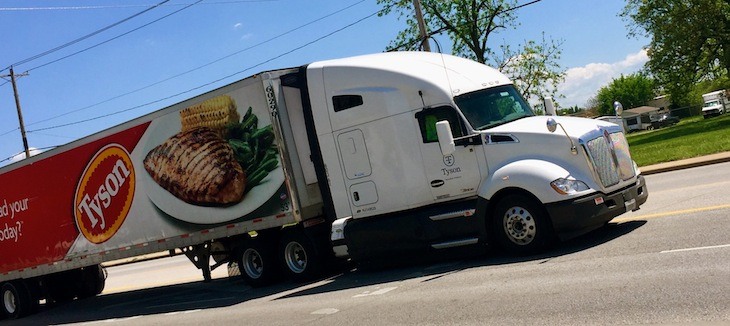Tyson Foods’ share price falls to 3-year low; market cap down more than $12 billion
by May 9, 2023 4:44 pm 1,588 views

Owning Tyson Foods has, in recent months, been a hard ride. The company’s share price has plummeted more than 46% in the past year. Since January, Tyson’s market cap – now at $20.785 billion – has lost $12.164 billion in value.
The market cap is for the Class A publicly traded shares. The Tyson family controls the voting with 100% ownership of the restricted Class B shares, which have a 10:1 voting advantage over Class A shares.
Tyson Foods stock price (NYSE: TSN) tumbled more than 16% to close at $50.73 – a three-year low – following Monday’s earnings report. Notably, it revealed a $97 million loss in the second fiscal quarter compared with an $829 million gain in the same quarter of the previous year. The Springdale-based company also lowered guidance on future earnings.
The company typically sees about 3.234 million shares traded on an average day, but Monday, there were nearly 25.16 million shares changing hands. Shares slid further Tuesday (May 9 ) to a low of $48.31 before closing at $48.81, down more than 3.7%, with 11.48 million shares traded.
In an exclusive interview, Tyson CEO Donnie King told Talk Business & Politics that it’s unusual to see all three meat businesses suffering macro-economic challenges at the same time. He said Tyson has 90 years of history and has seen many market cycles.
“We have gone through deep cycles before, and we always come out stronger,” King said.
He said weaker exports, lower prices for beef and sliding drop credit values – the prices paid for head, hide, organs and blood – helped squeeze packer margins. King said there is no short-term fix to the fundamentals, such as lower herd numbers, around higher live cattle costs. The beef segment is expected to see more margin challenges, which is why Tyson reduced earnings guidance for the back half of this year, including the busy summer grilling season.
King does see the chicken segment turning around sooner. He said the $166 million loss in the segment was largely one-time charges, including mark-to-market accounting for assets like corn and plant impairment expenses for line changes. Tyson’s chicken operating profit also was hurt with $92 million in charges related to plant closures in Van Buren and Glen Allen, Va. King said closures of the less productive facilities will benefit the company’s future financial performance.
In the quarter, Tyson grew its production volume of chicken despite the challenging dynamics. King said chicken prices began to recover in March, and the company’s lag-time processing model will follow. King told Talk Business & Politics that Tyson’s chicken business is competitive with everyone in the industry, something he could not have said two years ago.
“Chicken is a priority for me and for Tyson Foods. We are on the right path and should begin to benefit as we grow our volume mix of valued-added (higher margin) products,” King said.
King also said operational efficiency is central to Tyson’s plan to grow earnings. He said management could see the slower earnings cycles on the fringe late last year, which helped to set in motion the need to consolidate the corporate offices. King said Monday the consolidation is still underway, with more employees planning to move this summer. Tyson has not said how many people made the move, only that it went as expected.
King said recent corporate office layoffs were another attempt to drive efficiency, eliminate redundancy and create an aggressive change agenda which has been part of Tyson’s focus for the past two years. He said Tyson would continue to look for ways to run its business more efficiently so its customers and consumers are best served. On Monday, Tyson confirmed its corporate headcount in Springdale is around 4,000, down roughly 20% from late last year.
The company ended the quarter with $543 million in cash and cash equivalents, of which $11.637 million was used in stock repurchases. Tyson also had $8.5 billion of debt, including $1.1 billion in short-term maturities. In the first half of fiscal 2023, Tyson generated $769 million of cash from operations and spent $1.1 billion on capital expenditures. Tyson expects a total capital spend of $2.3 billion this fiscal year.
The company recently secured $1.75 billion in additional funding on May 3. Chief Financial Officer John R. Tyson said the $1 billion term loan from Bank of America and a second loan for $750 million would be used for general corporate purposes, the retirement of $593 million short-term commercial paper, and to fund the pending acquisition of Williams Sausage. Tyson reported interest expense of $173 million in April for the first six months of fiscal 2023, down from $197 million in the same period last year.
